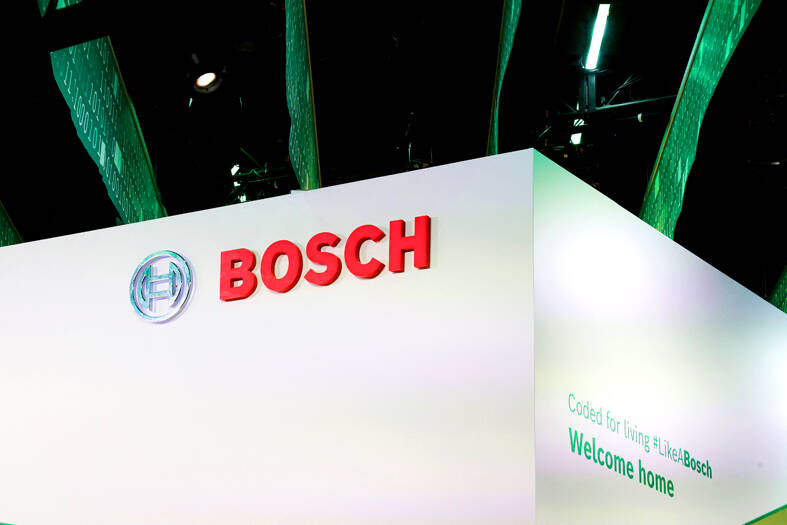German car parts supplier and home appliance maker Robert Bosch GmbH yesterday called for action to boost competitiveness in Europe’s struggling top economy as it reported falling profits and sales for last year.
Operating profit fell by a third, from 4.8 billion euros (US$5 billion) to 3.2 billion euros, with the firm blaming a weak global economy and slow growth in its electric vehicles (EVs) business.
Sales dipped 1 percent to 90.5 billion euros, the company said.

Photo: AFP
It was the latest sign of problems for Germany’s traditional manufacturers, particularly the flagship auto sector, which is facing a slowdown in EV sales, high manufacturing costs and fierce competition in key market China.
Bosch chief executive officer Stefan Hartung added his voice to calls for changes to improve the business climate in Germany, criticizing high energy prices and burdensome bureaucracy.
“Anything that makes doing business easier is a step in the right direction,” he said. “Then Germany and Europe can be among the world’s economic and technological frontrunners in the future.”
The number of Bosch staff fell last year by 11,500, to around 418,000, and the company said it could not rule out “painful decisions” in the future.
Bosch is the world’s biggest auto supplier, making products ranging from braking and steering systems to sensors. It also has other units making goods such as household appliances, heat pumps and air conditioners.
Continental AG, another car parts maker, on Thursday said that it would close five sites in Germany, putting 580 jobs at risk. That came on top of the 7,150 job cuts the company announced last year. The bad news comes after business groups organized demonstrations in cities across Germany earlier this week to send an “economic distress signal” to the government and demand urgent reforms.
Federal statistics agency Destatis on Thursday reported that GDP shrank 0.2 percent last year, in line with its earlier estimate and marking the second straight year of contraction for the German economy. The government this week slashed its growth outlook for this year to just 0.3 percent, down from a previous forecast of 1.1 percent.

TAKING STOCK: A Taiwanese cookware firm in Vietnam urged customers to assess inventory or place orders early so shipments can reach the US while tariffs are paused Taiwanese businesses in Vietnam are exploring alternatives after the White House imposed a 46 percent import duty on Vietnamese goods, following US President Donald Trump’s announcement of “reciprocal” tariffs on the US’ trading partners. Lo Shih-liang (羅世良), chairman of Brico Industry Co (裕茂工業), a Taiwanese company that manufactures cast iron cookware and stove components in Vietnam, said that more than 40 percent of his business was tied to the US market, describing the constant US policy shifts as an emotional roller coaster. “I work during the day and stay up all night watching the news. I’ve been following US news until 3am

UNCERTAINTY: Innolux activated a stringent supply chain management mechanism, as it did during the COVID-19 pandemic, to ensure optimal inventory levels for customers Flat-panel display makers AUO Corp (友達) and Innolux Corp (群創) yesterday said that about 12 to 20 percent of their display business is at risk of potential US tariffs and that they would relocate production or shipment destinations to mitigate the levies’ effects. US tariffs would have a direct impact of US$200 million on AUO’s revenue, company chairman Paul Peng (彭雙浪) told reporters on the sidelines of the Touch Taiwan trade show in Taipei yesterday. That would make up about 12 percent of the company’s overall revenue. To cope with the tariff uncertainty, AUO plans to allocate its production to manufacturing facilities in

Six years ago, LVMH’s billionaire CEO Bernard Arnault and US President Donald Trump cut the blue ribbon on a factory in rural Texas that would make designer handbags for Louis Vuitton, one of the world’s best-known luxury brands. However, since the high-profile opening, the factory has faced a host of problems limiting production, 11 former Louis Vuitton employees said. The site has consistently ranked among the worst-performing for Louis Vuitton globally, “significantly” underperforming other facilities, said three former Louis Vuitton workers and a senior industry source, who cited internal rankings shared with staff. The plant’s problems — which have not

COLLABORATION: Given Taiwan’s key position in global supply chains, the US firm is discussing strategies with local partners and clients to deal with global uncertainties Advanced Micro Devices Inc (AMD) yesterday said it is meeting with local ecosystem partners, including Taiwan Semiconductor Manufacturing Co (TSMC, 台積電), to discuss strategies, including long-term manufacturing, to navigate uncertainties such as US tariffs, as Taiwan occupies an important position in global supply chains. AMD chief executive officer Lisa Su (蘇姿丰) told reporters that Taiwan is an important part of the chip designer’s ecosystem and she is discussing with partners and customers in Taiwan to forge strong collaborations on different areas during this critical period. AMD has just become the first artificial-intelligence (AI) server chip customer of TSMC to utilize its advanced